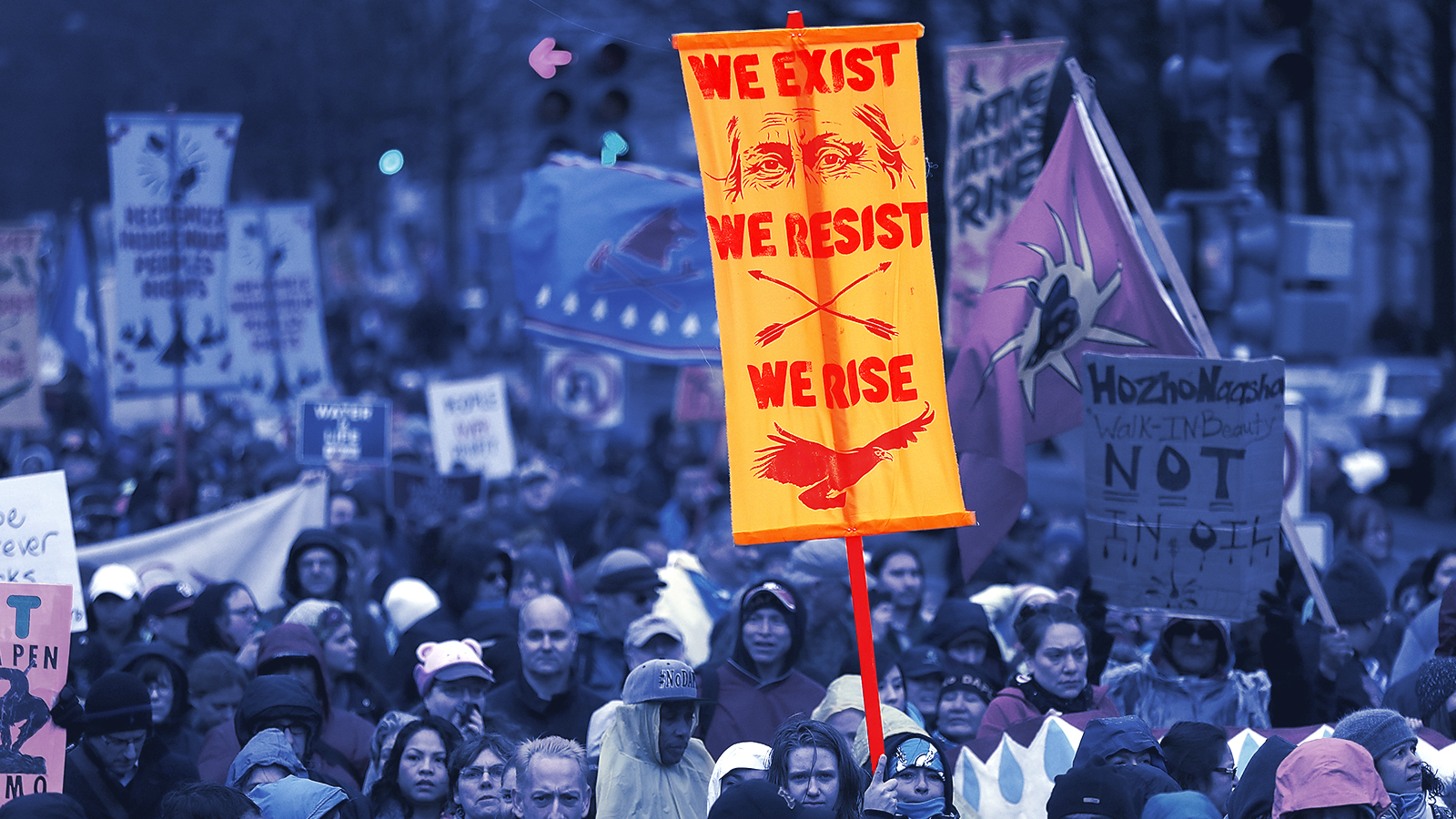One year ago, we wondered what would happen after a man who called climate change a Chinese hoax was elected president of the United States.
Certainly, 2017 will be remembered for a series of cringe-worthy political appointments, disappointing regulatory repeals, and controversial executive actions — not to mention Trump’s decision to exit the Paris Agreement. But it was also a year that birthed a new band of scrappy resisters who fought the climate-change denying, regulation-repealing powers that be.
As a result, 2017 was actually a pretty impressive year for resistance — and here are some of the efforts that led that charge:
Pipeline protesters fought back
Since the protests against the Dakota Access Pipeline became nation news last year, Native American organizers at Standing Rock have galvanized pipeline protests across the country — from activists opposing the Atlantic Sunrise pipeline in Pennsylvania to those pushing to stop development of the Bayou Bridge pipeline in Louisiana. Members of Congress have asked U.S. Attorney General Jeff Sessions to prosecute activists as “domestic terrorists” as local authorities and developers struggle to quell determined pipeline protests.
Although the Trump administration dealt a blow to the national movement when it allowed construction of Dakota Access to continue this year, the Standing Rock Sioux claimed victory in court when a judge mandated that the pipeline’s developer, Energy Transfer Partners, conduct a new environmental review of the project and develop an oil-spill response plan.
Thousands of nerds marched on Washington
Leaving the typical stoicism of their laboratories and academia behind, thousands of demonstrators with advanced degrees joined the March for Science in Washington, D.C., this April to protest rollbacks on environmental regulations and funding cuts to research. More than 600 solidarity marches popped up in cities across the world, each ringing with rally chants like, “Who runs the world? Nerds.”
While the marches may be over, the movement is still afoot: March for Science organizers have established a nonprofit group to “build a global community of science advocates.”
Scientists saved climate data
When they weren’t taking to the streets, scientists scrambled to save data posted on government websites. Fearing that the Trump administration would scrub federal sites of information on climate change or obscure other important research, researchers worked with dozens of coders, archivists, and librarians to preserve data sets and web pages from agencies, like the EPA, NOAA, and NASA. Thanks to their collective efforts, much of that knowledge is still available online at places like Data Refuge or the Environmental Data & Governance Initiative.
Ex-government employees dropped the mic
Mustafa Ali, former head of the EPA’s environmental justice program, stepped down after 24 years with the agency. But he went out with a bang, penning a three-page, open resignation letter to Administrator Scott Pruitt. “I didn’t want to take steps backward by rolling back regulations that are necessary to protect the health, the environment, the lives of our most vulnerable communities,” Ali said in an interview with Grist after his resignation. “I tried to be as patient as I could to see if we were going to prioritize the lives of these communities. And I just didn’t see it.” He’s now a senior vice president at Hip Hop Caucus and remains a vocal advocate for fenceline communities.
Thirty-year veteran and senior EPA official Betsy Southerland left her post in August, writing in her resignation letter that “the environmental field is suffering from the temporary triumph of myth over truth.” And Seattle’s Climate Change Advisor for the EPA, Mike Cox, walked away this year, too, sending a note to Pruitt that let the administrator know what employees think of his leadership: “This is the first time I remember staff openly dismissing and mocking the environmental policies of an Administration and by extension you, the individual selected to implement the policies.”
San Juan’s mayor said what many were thinking
Hurricane survivors across the U.S. are still recovering from the most devastating storm season in recent memory. American citizens in Puerto Rico have faced the added burden of asking for help from a federal government that oversaw a recovery effort riddled with accusations of corruption and mismanagement.
While Trump was busy tossing aid supplies to survivors like he was on a game show and rating his disaster response in Puerto Rico a perfect 10, no one kept it more real than San Juan Mayor Carmen Yulín Cruz. “Well, if it is a 10 out of a scale of 100, of course, it is still a failing grade,” Cruz told CNN, adding that Trump lives in an “alternative reality world.” She also called the president the “hater-in-chief” on Twitter. She has ostensibly been the most vocal leader demanding that FEMA improve its disaster response on the island and offer its residents the same care as their hurricane-ravaged counterparts in places like Texas and Florida.
Bears Ears tribes took Trump to court
When President Obama designated Bears Ears a national monument last year, it was a huge victory for five Utah tribes — the Navajo Nation, Ute Mountain Ute Tribe, Ute Indian Tribe, Hopi, and the Pueblo of Zuni. The coalition had come together in 2015 to push for the preservation of what they estimate are 100,000 cultural and ancestral sites in the region.
Earlier this month, President Trump signed a proclamation reducing the size of the monument by 80 percent. So the tribes acted in unison again to sue the new president. And others soon followed their lead — including 10 environmental organizations who lodged their own complaint, claiming that the president doesn’t have the power to cut land from national monuments.
Legislators pushed for environmental justice
New Jersey Senator Cory Booker and a trio of freshman Congressional representatives — California’s Nanette Barragán, Washington’s Pramila Jayapal, and Virginia’s Donald McEachin– were among those who introduced bills to protect their communities from the adverse health effects of climate change, pollution, toxic waste, and oil and gas drilling. The first-term reps. also established a Climate and Environmental Justice Congressional Task Force this year, the first environmental caucus in Congress to focus on the disproportionate burdens placed on communities of color and low-income families.
Companies defied the Trump agenda
After Trump’s announced plans to shrink Bears Ears, the outdoor clothing company Patagonia also filed a suit against Trump. “The President Stole Your Land,” the outfitter posted on its website, calling the shrinking of both Bears Ears and Grand Staircase-Escalante, another national monument in Utah, an “illegal move.” Other outdoor retailers made statements on social media, including REI and North Face, which pledged to donate $100,000 to the development of a Bears Ears education center.
Businesses also played a key role in the We Are Still In campaign, which recommitted to meeting targets set through the Paris Agreement at this year’s United Nations Climate Change Conference in Bonn, Germany. Among the more than 100 companies who have committed to transition to 100-percent renewable energy are Ikea, Adobe, Lego, Bloomberg, and Google.
Cities filled a leadership gap
The president may be planning to back out of the Paris Agreement, but hundreds of America’s cities are still in. Nearly 400 towns across the U.S. have committed to reducing emissions and working together to meet the targets set in the French capital. These cities have come together through initiatives like the Global Covenant of Mayors, Climate Mayors, and the Chicago Climate Charter. They also joined the We Are Still In campaign to show solidarity with the rest of the world.
States also thumbed their noses at Trump
Thirteen states and Puerto Rico joined the U.S. Climate Alliance, pledging to meet Paris accord goals, regardless of whether the Trump administration actually pulls out of the global pact. New York recently announced that it will divest nearly $400 million in its pension funds from fossil fuels and invest in renewables instead. And California Governor Jerry Brown has filled a void in U.S. leadership on climate change, playing a key role in Bonn and touring Europe as a special adviser to the U.N. climate conference.
Meanwhile attorneys general in several blue states, including California’s Xavier Becerra, Washington’s Bob Ferguson, and New York’s Eric Schneiderman, took a page from Scott Pruitt’s playbook — back when he was the lead counsel for Oklahoma. They are keeping the Trump administration’s attack on environmental protections tied up in the courts with lawsuits challenging its countless regulatory rollbacks.




